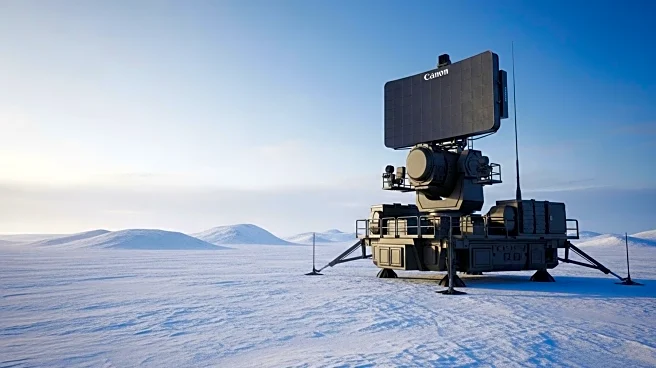What is the story about?
What's Happening?
Denmark has announced a significant increase in defense spending, totaling $4.2 billion, aimed at bolstering security in the Arctic and North Atlantic regions, including Greenland. This initiative includes the purchase of 16 additional F-35 fighter jets from the United States, increasing Denmark's fleet to 43. The Danish government, in collaboration with Greenland and the Faroe Islands, plans to enhance its military capabilities by acquiring new Arctic ships, maritime patrol planes, drones, and early warning radar systems. A new Arctic command headquarters will be established in Nuuk, Greenland, alongside a new military unit under the Joint Arctic Command. Additionally, an undersea cable connecting Greenland and Denmark will be funded to improve communication infrastructure. The Danish Chief of Defence, Michael Hyldgaard, emphasized the role of the Armed Forces in ensuring security throughout the Kingdom and defending Greenland, the Faroe Islands, and Denmark within the NATO framework.
Why It's Important?
This defense expansion reflects Denmark's strategic response to growing geopolitical tensions in the Arctic region, which is increasingly seen as a critical area due to its proximity to North America, Russia, and Europe. The investment in advanced military technology and infrastructure aims to strengthen Denmark's deterrence capabilities and fulfill its NATO obligations. The move comes amid concerns about President Trump's interest in Greenland, which he has expressed as a potential acquisition for its strategic location and resources. Denmark's actions underscore the importance of maintaining sovereignty and security in the Arctic, a region with significant geopolitical and economic implications due to its natural resources and strategic position.
What's Next?
Denmark's defense strategy may prompt reactions from other Arctic nations, particularly those with vested interests in the region, such as Russia and the United States. The establishment of new military infrastructure and capabilities could lead to increased military presence and activities in the Arctic, potentially affecting regional dynamics. As Denmark strengthens its defense posture, it may also engage in further diplomatic discussions with NATO allies to address shared security concerns and coordinate efforts in the Arctic. The development of the undersea cable and other infrastructure projects will likely enhance communication and operational efficiency for Denmark's military in the region.
Beyond the Headlines
The expansion of Denmark's military presence in the Arctic raises questions about the long-term environmental impact and the balance between defense activities and sustainable development in the region. The Arctic is home to fragile ecosystems, and increased military operations could pose challenges to conservation efforts. Additionally, the geopolitical focus on the Arctic may influence international relations and negotiations regarding territorial claims and resource exploration, highlighting the need for cooperative approaches to address these complex issues.















